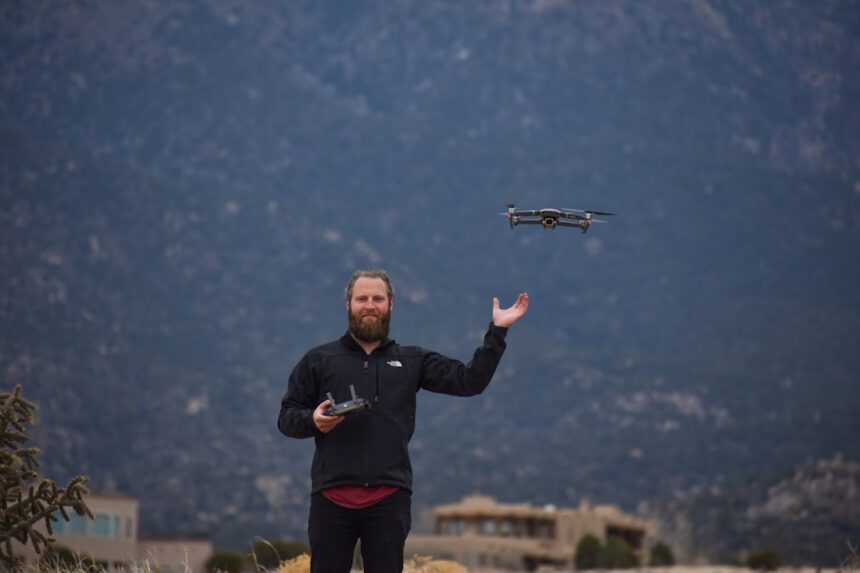In recent years, the advent of drone technology has revolutionized modern warfare, introducing a new dimension to combat scenarios. Among the most significant developments in this field is the emergence of drone swarms—groups of unmanned aerial vehicles (UAVs) that operate in unison to achieve strategic objectives. These swarms can be programmed to perform a variety of tasks, from reconnaissance missions to targeted strikes, and their ability to coordinate and adapt in real-time makes them formidable assets on the battlefield.
As military forces around the world increasingly integrate drone swarms into their operations, it becomes essential to understand not only their tactical advantages but also the psychological ramifications they impose on soldiers. The psychological impact of drone swarms on military personnel is a growing area of concern. While these technologies can enhance operational efficiency and reduce risks to human life, they also introduce unique stressors that can affect soldiers’ mental health.
The omnipresence of drones in combat zones can create an atmosphere of constant surveillance and unpredictability, leading to heightened anxiety and fear among troops. As the military grapples with the implications of this new warfare paradigm, it is crucial to explore how drone swarms influence soldiers’ mental well-being and combat performance.
Key Takeaways
- Drone swarms have a significant impact on soldiers’ mental health, combat performance, and long-term psychological well-being.
- Soldiers facing drone swarms may experience fear, anxiety, and stress, leading to decreased combat effectiveness.
- Coping mechanisms and leadership support are crucial for helping soldiers deal with the psychological impact of drone swarms.
- Ethical considerations of using drone swarms in warfare should include the potential psychological effects on soldiers.
- Training, preparedness, and access to mental health resources are essential for addressing the psychological impact of drone swarms on soldiers.
The Fear Factor: How Drone Swarms Affect Soldiers’ Mental Health
The presence of drone swarms in combat environments can evoke a profound sense of fear among soldiers. Unlike traditional warfare, where threats may be more visible and tangible, drone swarms operate from a distance, often remaining unseen until they strike. This unpredictability can lead to a pervasive sense of vulnerability, as soldiers may feel they are constantly being watched or targeted without warning.
The psychological toll of this fear can manifest in various ways, including heightened anxiety, paranoia, and an overwhelming sense of helplessness. Moreover, the fear associated with drone swarms is not limited to the immediate threat of attack. Soldiers may also grapple with the moral implications of engaging in warfare that relies heavily on technology.
The detachment that comes with operating drones from afar can create a dissonance between their actions and the consequences faced by those on the ground. This internal conflict can exacerbate feelings of guilt and shame, further complicating their mental health landscape. As soldiers navigate these complex emotions, it becomes evident that the fear factor associated with drone swarms extends beyond the battlefield, influencing their overall psychological resilience.
The Impact of Drone Swarms on Combat Performance

The integration of drone swarms into military operations has significant implications for combat performance. On one hand, these technologies can enhance situational awareness and provide real-time intelligence, allowing soldiers to make informed decisions in high-pressure environments. The ability to deploy multiple drones simultaneously can overwhelm adversaries and create tactical advantages that were previously unattainable.
However, the psychological effects of operating in an environment dominated by drone swarms can also hinder performance. The constant presence of drones can lead to cognitive overload for soldiers, as they must remain vigilant against potential threats while processing vast amounts of information. This mental strain can impair decision-making abilities and reduce reaction times, ultimately affecting mission outcomes.
Additionally, the fear and anxiety associated with drone swarms can lead to decreased morale among troops, further impacting their effectiveness in combat situations. As military leaders seek to leverage the advantages of drone technology, they must also consider the potential drawbacks on soldiers’ mental acuity and overall performance.
Coping Mechanisms for Soldiers Facing Drone Swarms
| Types of Coping Mechanisms | Effectiveness |
|---|---|
| Training in drone defense tactics | High |
| Psychological counseling and support | Moderate |
| Physical fitness and stress management | High |
| Team support and camaraderie | High |
In light of the unique challenges posed by drone swarms, it is essential for soldiers to develop effective coping mechanisms to manage their mental health. One approach involves fostering resilience through training programs that emphasize stress management techniques. These programs can equip soldiers with tools to navigate the psychological challenges associated with drone warfare, such as mindfulness practices, breathing exercises, and cognitive-behavioral strategies.
By cultivating a sense of control over their mental state, soldiers may be better prepared to face the uncertainties of combat. Additionally, peer support plays a crucial role in helping soldiers cope with the psychological impact of drone swarms. Building strong camaraderie within units can create a supportive environment where individuals feel comfortable sharing their experiences and emotions.
Engaging in open discussions about fears and anxieties can help normalize these feelings and reduce stigma surrounding mental health issues. By fostering a culture of support and understanding, military leaders can empower soldiers to seek help when needed and promote overall well-being within their ranks.
Post-Traumatic Stress Disorder (PTSD) and Drone Swarms
The relationship between exposure to drone swarms and the development of post-traumatic stress disorder (PTSD) is an area of increasing concern among mental health professionals. Soldiers who experience the stressors associated with drone warfare may be at heightened risk for PTSD due to the unique nature of these encounters. The constant threat posed by drones, coupled with the moral complexities of remote warfare, can create a perfect storm for psychological distress.
Research indicates that individuals exposed to high-stress environments are more likely to develop PTSD symptoms, including flashbacks, nightmares, and severe anxiety. For soldiers facing drone swarms, these symptoms may be exacerbated by feelings of isolation and disconnection from traditional combat experiences. The inability to process trauma in a conventional manner can complicate recovery efforts and prolong suffering.
As military organizations strive to address these challenges, it is imperative to implement comprehensive mental health support systems tailored specifically for those affected by drone warfare.
The Role of Leadership in Supporting Soldiers Facing Drone Swarms

Leadership plays a pivotal role in shaping the mental health landscape for soldiers confronting the challenges posed by drone swarms. Effective leaders must prioritize mental well-being by fostering an environment that encourages open communication about psychological struggles. By demonstrating vulnerability themselves and sharing their experiences, leaders can create a culture where seeking help is normalized rather than stigmatized.
Moreover, leaders should advocate for access to mental health resources tailored to the unique experiences of soldiers dealing with drone swarms. This includes providing training for mental health professionals who understand the specific stressors associated with modern warfare technology. By ensuring that soldiers have access to appropriate support systems, leaders can help mitigate the psychological impact of drone swarms and promote resilience within their units.
Ethical Considerations of Using Drone Swarms in Warfare
The deployment of drone swarms raises significant ethical questions that extend beyond tactical advantages. The ability to conduct warfare remotely introduces moral dilemmas regarding accountability and the value of human life. As military forces increasingly rely on technology to engage in combat, concerns arise about the potential desensitization of soldiers to violence and the erosion of traditional ethical standards in warfare.
Furthermore, the use of drone swarms may blur the lines between combatants and non-combatants, raising questions about collateral damage and civilian casualties. The ethical implications of targeting individuals from a distance without direct engagement challenge established norms surrounding just war theory and proportionality in military action. As societies grapple with these ethical considerations, it becomes essential for military leaders and policymakers to engage in thoughtful discourse about the implications of drone warfare on humanity.
The Long-Term Psychological Effects of Drone Swarm Exposure
The long-term psychological effects of exposure to drone swarms are still being studied, but early indications suggest that they may be profound and lasting. Soldiers who have experienced the stressors associated with drone warfare may face ongoing challenges related to anxiety, depression, and PTSD long after their service has ended. The unique nature of these experiences—marked by feelings of isolation and moral conflict—can complicate recovery efforts and hinder reintegration into civilian life.
Additionally, the societal perception of drone warfare may further exacerbate these psychological effects. Soldiers may struggle with feelings of alienation as they attempt to reconcile their experiences with public attitudes toward modern warfare. This disconnect can lead to difficulties in forming relationships and finding support networks outside the military community.
As awareness grows regarding the long-term consequences of exposure to drone swarms, it becomes increasingly important for mental health professionals to develop targeted interventions that address these specific challenges.
Seeking Help: Mental Health Resources for Soldiers Dealing with Drone Swarms
Recognizing the need for mental health support is crucial for soldiers grappling with the psychological impact of drone swarms. Various resources are available to assist those in need, including counseling services provided by military organizations and community-based programs focused on veterans’ mental health. These resources often include access to trained professionals who understand the unique challenges faced by service members exposed to modern warfare technologies.
In addition to traditional therapy options, peer support groups can offer valuable avenues for connection and healing. These groups provide a safe space for individuals to share their experiences and learn from one another’s coping strategies. By fostering a sense of community among those who have faced similar challenges, soldiers may find solace in knowing they are not alone in their struggles.
Training and Preparedness for Facing Drone Swarms
As military forces continue to adapt to the realities of drone warfare, training programs must evolve accordingly to prepare soldiers for the psychological challenges they may encounter. Incorporating mental resilience training into standard military curricula can equip service members with essential skills for managing stress and anxiety related to drone swarms. This training should emphasize practical techniques for maintaining focus under pressure while also addressing emotional well-being.
Furthermore, simulations that replicate scenarios involving drone swarms can provide soldiers with valuable experience in navigating high-stress environments. By exposing troops to realistic situations where they must respond to drone threats, military leaders can help build confidence and competence among service members.
Addressing the Psychological Impact of Drone Swarms on Soldiers
The integration of drone swarms into modern warfare presents both opportunities and challenges for military personnel. While these technologies offer tactical advantages that can enhance operational effectiveness, they also introduce unique psychological stressors that demand attention from military leaders and mental health professionals alike. Understanding how drone swarms affect soldiers’ mental health is crucial for developing effective support systems that promote resilience and well-being.
By fostering open communication about psychological struggles and providing access to appropriate support systems, leaders can help mitigate the impact of these stressors on soldiers’ lives. Ultimately, addressing the psychological effects of drone warfare is essential not only for individual service members but also for maintaining a healthy and effective military force capable of navigating the complexities of modern conflict.
In recent years, the use of drone swarms in military operations has raised significant concerns about their psychological impact on soldiers. These autonomous systems, capable of overwhelming adversaries with sheer numbers, can induce stress and anxiety among troops who must adapt to this new form of warfare. An article on In The War Room delves into the psychological challenges faced by soldiers when confronted with drone swarms, exploring how these technologies are reshaping the battlefield and the mental resilience required to cope with such advancements. The piece provides valuable insights into the evolving nature of military engagements and the importance of preparing soldiers for the psychological demands of modern warfare.
FAQs
What is a drone swarm?
A drone swarm is a group of drones that work together in a coordinated manner, often communicating with each other to achieve a common goal.
How do drone swarms impact soldiers psychologically?
Drone swarms can have a significant psychological impact on soldiers, causing feelings of fear, anxiety, and helplessness. The unpredictability and overwhelming nature of a swarm can lead to increased stress and decreased morale among soldiers.
What are some potential psychological effects of encountering a drone swarm in combat?
Soldiers may experience heightened levels of stress, fear, and anxiety when encountering a drone swarm in combat. This can lead to decreased cognitive function, impaired decision-making, and increased risk of post-traumatic stress disorder (PTSD).
How do military organizations address the psychological impact of drone swarms on soldiers?
Military organizations may provide psychological support and counseling to soldiers who have encountered drone swarms in combat. Additionally, training and preparation for drone swarm encounters may help mitigate the psychological impact on soldiers.
Are there any long-term psychological effects of encountering drone swarms in combat?
Long-term psychological effects of encountering drone swarms in combat may include PTSD, anxiety disorders, and other mental health issues. These effects can have a lasting impact on soldiers’ well-being and may require ongoing support and treatment.




